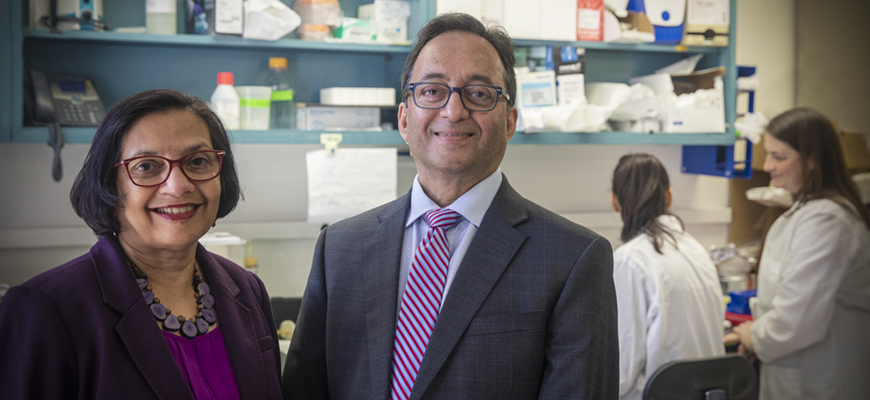
UofSC sees increase in federal funding for health sciences
Researchers using funds to focus on preventative research
Posted on: November 18, 2019; Updated on: November 18, 2019
By Tenell Felder, tenell@mailbox.sc.edu, 803-777-3697
Researchers from the University of South Carolina are unlocking how botanicals could defeat chronic inflammation, how to prevent literacy failure in students with hearing loss and how childhood obesity can be eliminated.
These projects, along with many others, have the capacity to improve quality of life statewide and beyond.
In the 2019 fiscal year, UofSC received more than $100 million in federal funding for health sciences, particularly from highly competitive sources such as the National Institutes of Health (NIH). The university’s largest federal funding source was the U.S. Department of Health and Human Services with awards totaling $51.1 million.
UofSC Vice President for Research Prakash Nagarkatti credits the growth in health sciences funding to three factors: interdisciplinary collaboration, state-focused research and preventative-focused research.
These factors create impactful research projects that attract funding.
“Looking at any of the major problems our society faces … I don’t think a single investigator or discipline can find solutions by themselves. Here, at UofSC, the faculty have opportunities to collaborate between engineering, health sciences, environmental sciences. … It gives us the opportunity to put together interdisciplinary research teams,” Nagarkatti says.
Nagarkatti says collaboration ensures that researchers are not working “in silos” and are capitalizing on each other’s expertise and research.
We are a comprehensive research university and are ranked by the Carnegie Foundation as a Tier 1 research university. … We really have some superstars.
Prakash Nagarkatti, UofSC vice president for research
Office of the Vice President for Research’s internal grant programs like Advanced Support for Innovative Research (ASPIRE) allow faculty to develop and fund preliminary research that could lead to receiving external grants. Nagarkatti views internal grants as investments.
“When faculty apply for external grants, we ask them whether they’ve used an ASPIRE grant to develop ideas or to develop the preliminary data necessary for applying for external grants,” he says. “So, by investing just over $15 million, we’ve recovered more than $170 million in external awards to previous ASPIRE recipients.”
College of Pharmacy professor Igor B. Roninson has also seen the benefits that grants provide for advancing their research projects.
“I have witnessed firsthand how NIH COBRE (Center of Biomedical Research Excellence) grants transform an institution like ours, providing funding and motivation for coordinating research endeavors in medically important and fundable fields, through building research resource infrastructure, enabling targeted faculty recruitment and providing mentorship to new faculty,” Roninson says.
Nagarkatti also credits an increase in funding to a focus on preventative research.
Reflecting national health trends, South Carolina ranks high in diabetes and obesity, which directly leads to other chronic health problems.
“Our citizens experience certain health challenges, so faculty may propose a grant to try to help overcome these challenges through research. … We are focusing on how to prevent the onset of diseases through diet, nutrition and exercise,” Nagarkatti says.
Arnold School of Public Health professor and NIH grant recipient Michael Beets was awarded funding to study summer weight gain in children.
“Children gain three to five times more weight over the three-month summer vacation than during the entire nine-month school year. Fitness gains achieved during the school year are erased over the summer months,” Beets says.
Beets anticipates his study will produce successful intervention methods to reverse unhealthy summer weight gain in children.
Fellow Arnold School professor and National Institute on Deafness and Other Communication Disorders (NIDCD) grant recipient Krystal Werfel is studying early literacy intervention for students with hearing loss.
Werfel’s study could prevent literacy failure in students with hearing loss.
“Earlier identification will allow educators to provide more intensive or perhaps different intervention tailored to (students’) specific needs during preschool, with the goal of preventing later reading failure,” Werfel says.
Nagarkatti’s research, on which he partners with his wife, Mitzi Nagarkatti, a SmartState Endowed Chair, Carolina Distinguished Professor and Chair of the Department of Pathology, Microbiology and Immunology at the UofSC School of Medicine Columbia, aims to prevent diseases that are caused by inflammation. They have received more than $34 million in NIH grants to support their studies on botanicals and inflammation by establishing two Centers of Research Excellence, which began in 2007.
“Currently, inflammation is considered to be the underlying cause of most clinical disorders. If you can develop a drug that can treat chronic inflammation, you may be able to prevent a large number of diseases that are triggered by it. … So, we’ve established centers that look at botanicals,” Prakash Nagarkatti says. “That helped us focus on natural products like resveratrol that is found in red grapes and red wine, indoles that are found in cruciferous and green vegetables, CBD that’s found in the hemp plant.
“There is a huge opportunity for us to look at natural products and identify the ingredients that can be used to suppress inflammation. In fact, we are excited that our findings on use of CBD to treat inflammation in the liver has been approved by FDA as a drug.”
Nagarkatti is optimistic that UofSC will continue to set records for research and sponsored awards across all disciplines.
“We are a comprehensive research university and are ranked by the Carnegie Foundation as a Tier 1 research university. … We really have some superstars.”